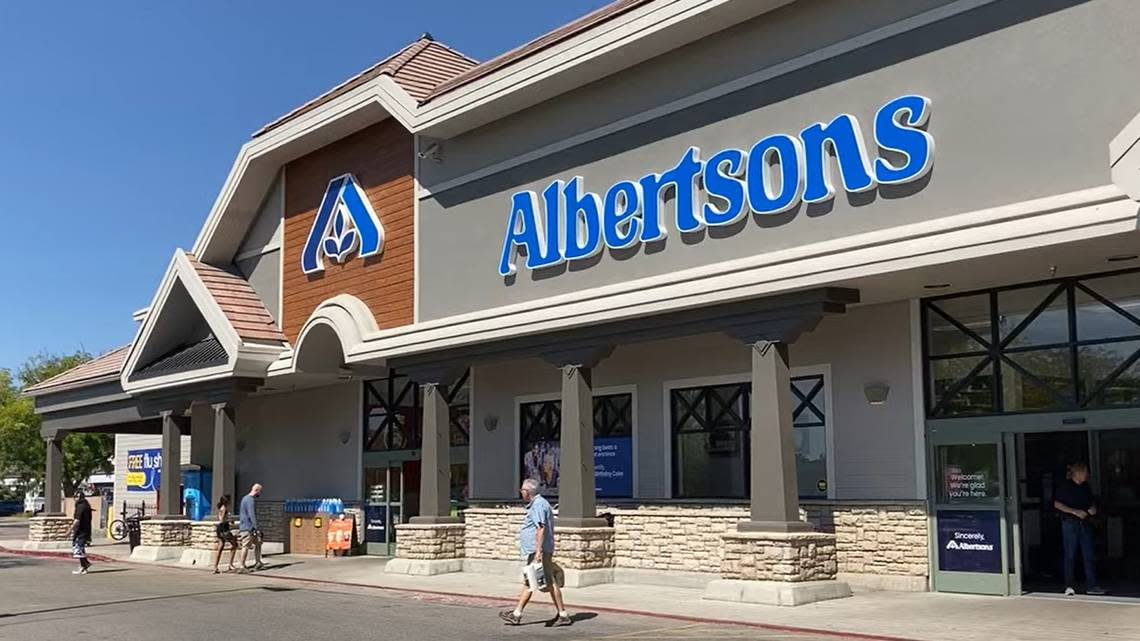Is government aiming at wrong target in supermarket-merger lawsuit? What Albertsons says

The federal government is suing to block Kroger’s $24.6 billion merger with Boise’s Albertsons supermarket chain.
The Federal Trade Commission said Monday that Kroger’s acquisition, which is the largest proposed supermarket merger in U.S. history, would “eliminate fierce competition” between the two grocery giants, leading to higher prices for consumers.
The FTC alleged the merger would also harm workers, threatening their ability to bargain for higher wages, better benefits and improved working conditions, a news release said. The two chains are direct competitors.
“This supermarket mega merger comes as American consumers have seen the cost of groceries rise steadily over the past few years,” Henry Liu, director of the FTC’s Bureau of Competition, said in a news release. “Kroger’s acquisition of Albertsons would lead to additional grocery price hikes for everyday goods, further exacerbating the financial strain consumers across the country face today.”
A bipartisan group of nine attorneys general — from Oregon, Wyoming, Nevada, Arizona, California, New Mexico, Illinois, Maryland and the District of Columbia — is joining the FTC’s lawsuit, according to the news release. The attorneys general of Colorado and Washington have filed their own lawsuits to block the merger.
The three-member FTC voted unanimously to sue, and the lawsuit was filed Monday in federal court in Portland.
Albertsons said in a statement that its merger would instead expand competition, lower prices, increase wages, protect union jobs and improve customers’ shopping experience.
The statement said that blocking the acquisition would only strengthen retailers like Amazon, Walmart and Costco. It noted that Walmart’s market share is roughly twice that size of a combined Albertsons and Kroger, even before the 400-plus store divestitures that the two companies proposed when they were seeking to win the FTC’s approval of the merger.
“In contrast, Albertsons Cos.’ merger with Kroger will ensure our neighborhood supermarkets can better compete with these mega retailers, all while benefiting our customers, associates, and communities,” Albertsons’ statement said. “We are disappointed that the FTC continues to use the same outdated view of the U.S. grocery industry it used 20 years ago, and we look forward to presenting our arguments in court.”
The companies agreed in September to sell 413 Kroger- and Albertsons-owned stores, including 13 Albertsons stores in Idaho, to C&S Wholesale Grocers to ease federal regulators’ antitrust concerns. C&S is a little-known grocery-supply firm owned by a New Hampshire billionaire that also oversees two retail supermarket chains in the South, Midwest and Northeast.
Kroger, a Cincinnati-based grocery chain, renewed its pledge on Feb. 13 to lower prices if the merger is approved, saying it “consistently lowered prices and improved the customer experience during previous mergers.” It also pledged to spend $1.3 billion to improve Albertsons stores.
Kroger first announced its plans to take over Albertsons in October 2022. Kroger’s store banners include Fred Meyer, which competes with Albertsons in the Boise area and other Northwest markets.
Albertsons is Idaho’s largest company and a Boise icon, with 290,000 employees nationwide and more than 5,000 employees in Idaho, the Idaho Statesman previously reported. It operates nearly 2,300 stores in 34 states under multiple banners.
Albertsons was founded by Joe Albertson 85 years ago with a single supermarket in Boise. Albertsons’ store banners include Safeway, which it acquired in 2015.
Local 555 of the United Food and Commercial Workers Union, a food workers’ union that represents more than 1,000 Albertsons grocery workers in Idaho, endorsed the merger on Feb. 19, saying its members would likely be better off with it than without it, because its members work at multiple stores that would be sold to C&S, whose leadership impressed union representatives.
“After meeting with C&S on the divestitures of stores as part of the Kroger/Albertsons merger, we were pleased to find not only that they understood and liked the grocery business, but also recognized the importance of quality employees to their ongoing success,” Dan Clay, the president of UFCW Local 555, said in a statement.
But the union overall opposes the merger. “The UFCW stands — and will continue to stand — in opposition to any merger that would negatively impact our hundreds of thousands of hard-working members who work at Kroger and Albertsons,” the national union said Monday in an emailed statement.
The FTC is an independent federal agency assigned to protect consumers and ensure competitive markets, in part by enforcing antitrust laws. It shares responsibility for filing civil antitrust lawsuits with the U.S. Justice Department.
Thousands of stores under Kroger, Albertsons banners
Kroger has 2,750 stores in 36 states under banners including Kroger, Fred Meyer, Fry’s, Harris Teeter, King Soopers, Quality Food Centers, Ralphs, Dillons, Smith’s, City Market, Owen’s, Jay C, Pay Less, Baker’s, Gerbes, Pick ‘n Save, Metro Market and Mariano’s.
Albertsons has 2,272 stores in 35 states under banners including Albertsons, Safeway, Haggen, Jewel-Osco, Pavilions, Vons, Shaw’s, Acme, Tom Thumb, Randalls, United Supermarkets, Star Market, Carrs, Kings Food Markets and Balducci’s Food Lovers Market.
Under the proposed merger, Kroger would operate over 5,000 stores and about 4,000 pharmacies, with nearly 700,000 employees across 48 states.
Food workers’ union bucks peers, backs Kroger takeover of Boise’s Albertsons. This is why
Boise-area food supplier recalls sandwiches from local stores. Did you buy one?
Kroger-Albertsons proposal faces another hurdle. Washington AG sues to block merger
Kroger would sell 1/3 of Albertsons’ Idaho stores after merger. Meet the billionaire buyer
